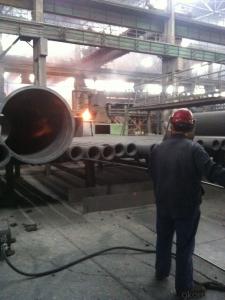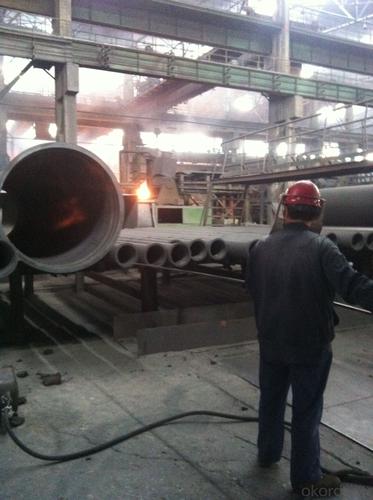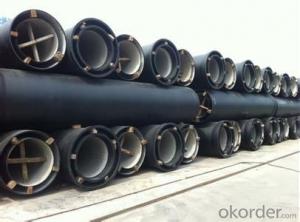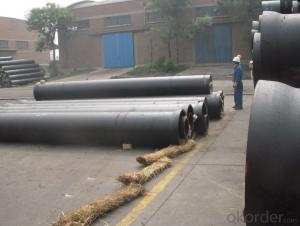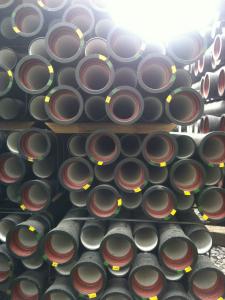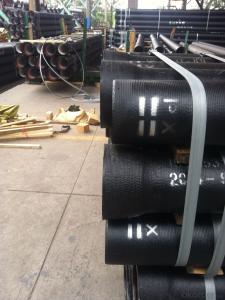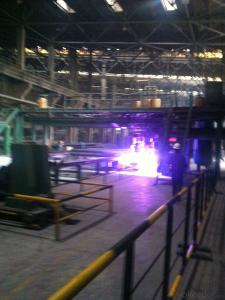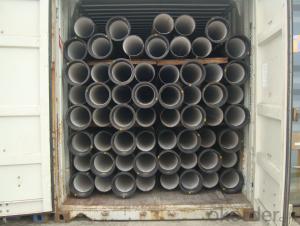DUCTILE IRON PIPE AND PIPE FITTINGS K8CLASS DN800
- Loading Port:
- Tianjin
- Payment Terms:
- TT OR LC
- Min Order Qty:
- 23 pc
- Supply Capability:
- 3000 pc/month
OKorder Service Pledge
OKorder Financial Service
You Might Also Like
· Material : Ductile Cast Iron
· Size Range : DN 80mm to DN 2000mm
· Unit Effective Length : 6m or 5.7m
· Manufacture Standard: ISO 2531:1998/ EN 545:2006/EN 598:2007
· Annual capacity : 200,000 tons
· Coating Exterior: Zinc 130g/m2 according to ISO 8179-1 and bitumen coating 70 microns.
· Cement Interior: Portland Cement/ High Alumina Cement/ Sulphate Resisting Cement Lining according to ISO 4179
· Special requirements on external coating and internal lining can be applied
· We also provide accessories such as SBR/EPDM rubber gaskets, lubricant paste, pipe caps, PE sleeves, etc.
Additional Parts:
Each pipe is strictly inspected according to related standard to ensure permanently high performance.
Easy Installation at site and service free for life
Long Service Lifespan
Quotation will arrive you within 24hours once we get your inquiry.
We guarantee offering you a competitive price.
A copy of original inspection reports of pipes will be offered after shipment.
Photos of loading process will be sent to the customer after shipment effect.
We will follow-up the delivery progress after shipment effect and update to the customer on weekly basis.
- Q: Are ductile iron pipes suitable for mining applications?
- Yes, ductile iron pipes are suitable for mining applications. Ductile iron pipes are known for their strength, durability, and resistance to corrosion, making them ideal for underground mining operations. They can withstand high pressure, heavy loads, and abrasive materials commonly found in mining environments. Additionally, their flexible nature allows for easy installation and maintenance in challenging mining conditions.
- Q: Are ductile iron pipes suitable for use in irrigation pivot systems?
- Yes, ductile iron pipes are suitable for use in irrigation pivot systems. Ductile iron is a strong and durable material that can withstand the high pressures and stress that are often present in irrigation systems. It is resistant to corrosion and can handle the constant exposure to water and various chemicals used in irrigation. Additionally, ductile iron pipes have a smooth interior surface, which helps to maintain a consistent water flow and minimize friction losses. Overall, ductile iron pipes are a reliable choice for irrigation pivot systems due to their strength, durability, and corrosion resistance.
- Q: How does ductile iron pipe perform in areas with high groundwater levels?
- Ductile iron pipe proves to be highly effective in areas characterized by elevated groundwater levels. A notable advantage of this type of pipe lies in its resistance to corrosion, rendering it particularly suitable for underground applications and areas with high water tables. Unlike alternative materials, ductile iron pipe remains impervious to rust or corrosion caused by groundwater, ensuring its longevity and durability. Moreover, ductile iron pipe is distinguished by its exceptional strength and flexibility, enabling it to withstand the external pressure exerted by high groundwater levels. It effectively resists the buoyant forces exerted by water, thereby preventing any displacement or flotation. Furthermore, the joints of ductile iron pipe are tightly sealed, thus preventing any infiltration of groundwater into the pipe system. This guarantees the absence of leaks or water supply contamination, which is of utmost importance in areas with high groundwater levels. All in all, ductile iron pipe emerges as the optimal choice for areas with high groundwater levels due to its corrosion resistance, strength, and ability to maintain a secure and tightly sealed system. It provides a dependable and long-lasting solution for water distribution and sewer systems, even in challenging environments.
- Q: What are the recommended bedding and backfill materials for ductile iron pipe?
- The recommended bedding and backfill materials for ductile iron pipe typically include a layer of granular material, such as sand or pea gravel, for bedding and a layer of compacted soil or select backfill material for backfilling. This helps to distribute load and protect the pipe from external forces while maintaining stability and preventing damage.
- Q: What is the typical cost of maintenance for ductile iron pipes?
- The typical cost of maintenance for ductile iron pipes can vary depending on various factors such as the length of the pipes, the condition of the surrounding soil, and the specific maintenance activities required. However, on average, the cost of maintenance for ductile iron pipes can range from a few hundred to a few thousand dollars per mile per year.
- Q: Are ductile iron pipes suitable for trenchless pipe bursting methods?
- Yes, ductile iron pipes are suitable for trenchless pipe bursting methods. Ductile iron is a strong and durable material that can withstand the forces involved in the pipe bursting process. It has high tensile strength, making it resistant to cracking or breaking during the bursting process. Additionally, ductile iron pipes have a smooth inner surface, which allows for efficient flow of water or other fluids. This smooth surface also reduces the likelihood of blockages or buildup in the pipe. Overall, ductile iron pipes are a reliable choice for trenchless pipe bursting methods.
- Q: Can ductile iron pipe be used in high-pressure applications?
- Indeed, high-pressure applications can utilize ductile iron pipe. Ductile iron pipe possesses impressive strength and durability, rendering it appropriate for diverse applications, particularly high-pressure systems. Its tensile strength and yield strength surpass those of alternative cast iron pipes, enabling it to endure elevated pressures. Moreover, ductile iron pipe resists corrosion and upholds its structural integrity even amidst high-pressure conditions. Nonetheless, it is crucial to guarantee the accurate installation of the pipe and adherence to all essential safety measures to ensure the secure and efficient operation of the high-pressure system.
- Q: How can the ductile iron pipe be tested?
- Good command of pipe connection must be by hand when a pressure test, must be clear, on the back, pier, interface division, each part of the exhaust valve, must be responsible, then carefully inspected and clear and uniform pressure test.
- Q: What is the difference between cast iron pipe and seamless steel pipe and galvanized steel pipe?
- Cast iron pipe: cast pipe made of cast iron. Cast iron pipes are used for water supply, drainage and gas transmission lines. They include cast iron pipes and pipe fittings. Labor intensity is small. According to the casting method, it is divided into continuous cast iron pipe and centrifugal cast iron pipe, in which the centrifugal cast iron pipe is divided into sand mould and metal type two kinds. Divided into gray cast iron pipe and nodular cast iron pipe according to different material. According to the interface form, it is divided into flexible interface, flange interface, self anchored interface, rigid interface and so on. Among them, the flexible iron pipes rubber sealing ring; flange interface cast iron pipe flange fixed in the rubber pad, the flange gasket sealing; rigid interface cast iron pipe socket is large, straight pipe is inserted, sealed with cement, this technology has been basically eliminated.
- Q: What is the expected pressure class for ductile iron pipes?
- The pressure class anticipated for ductile iron pipes may differ based on the particular use and project needs. In a general sense, ductile iron pipes are engineered to manage high-pressure situations and are typically offered in pressure classes spanning from 150 psi to 350 psi. These pressure classes signify the utmost operational pressure that the pipe can endure while preserving its structural soundness. To ascertain the suitable pressure class for ductile iron pipes in a specific scenario, it is crucial to refer to industry standards, guidelines, and project specifications.
Send your message to us
DUCTILE IRON PIPE AND PIPE FITTINGS K8CLASS DN800
- Loading Port:
- Tianjin
- Payment Terms:
- TT OR LC
- Min Order Qty:
- 23 pc
- Supply Capability:
- 3000 pc/month
OKorder Service Pledge
OKorder Financial Service
Similar products
Hot products
Hot Searches
Related keywords
